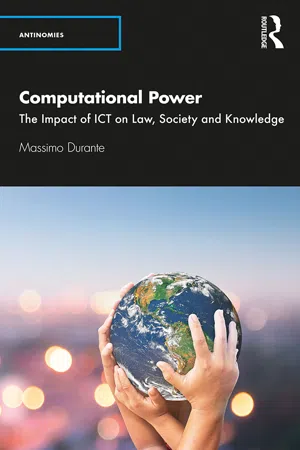
- 182 pages
- English
- ePUB (mobile friendly)
- Available on iOS & Android
About this book
We delegate more and more decisions and tasks to artificial agents, machine-learning mechanisms, and algorithmic procedures or, in other words, to computational systems. Not that we are driven by powerful ambitions of colonizing the Moon, replacing humans with legions of androids, creating sci-fi scenarios à la Matrix or masterminding some sort of Person of Interest -like Machine. No, the current digital revolution based on computational power is chiefly an everyday revolution.
It is therefore that much more profound, unnoticed and widespread, for it affects our customary habits and routines and alters the very texture of our day-to-day lives. This opens a precise line of inquiry, which constitutes the basic thesis of the present text: our computational power is exercised by trying to adapt not just the world but also our representation of reality to how computationally based ICTs work. The impact of this technology is such that it does not leave things as they are: it changes the nature of agents, habits, objects and institutions and hence it subverts the existing order, without necessarily generating a new one.
I argue that this power is often not distributed in an egalitarian manner but, on the contrary, is likely to result in concentrations of wealth, in dominant positions or in unjust competitive advantages. This opens up a struggle, with respect to which the task of reaffirming the fundamental values, the guiding principles, the priorities and the rules of the game, which can transform, or attempt to transform, a fierce confrontation between enemies in a fair competition between opponents rests on us.
Frequently asked questions
- Essential is ideal for learners and professionals who enjoy exploring a wide range of subjects. Access the Essential Library with 800,000+ trusted titles and best-sellers across business, personal growth, and the humanities. Includes unlimited reading time and Standard Read Aloud voice.
- Complete: Perfect for advanced learners and researchers needing full, unrestricted access. Unlock 1.4M+ books across hundreds of subjects, including academic and specialized titles. The Complete Plan also includes advanced features like Premium Read Aloud and Research Assistant.
Please note we cannot support devices running on iOS 13 and Android 7 or earlier. Learn more about using the app.
Information
Table of contents
- Cover
- Half Title
- Series Page
- Title Page
- Copyright Page
- Dedication
- Table of Contents
- Acknowledgments
- Foreword
- Introduction: Computational power
- 1. The information revolution
- 2. Technology: From instrument to environment
- 3. Artificial and human intelligence
- 4. Memory and oblivion
- 5. Data, information and knowledge
- 6. Truth and fake news
- 7. The governance of algorithms
- 8. The asymmetric distribution of data and rights
- 9. Exit, voice and loyalty
- Conclusion: The shelf of the world
- Bibliography